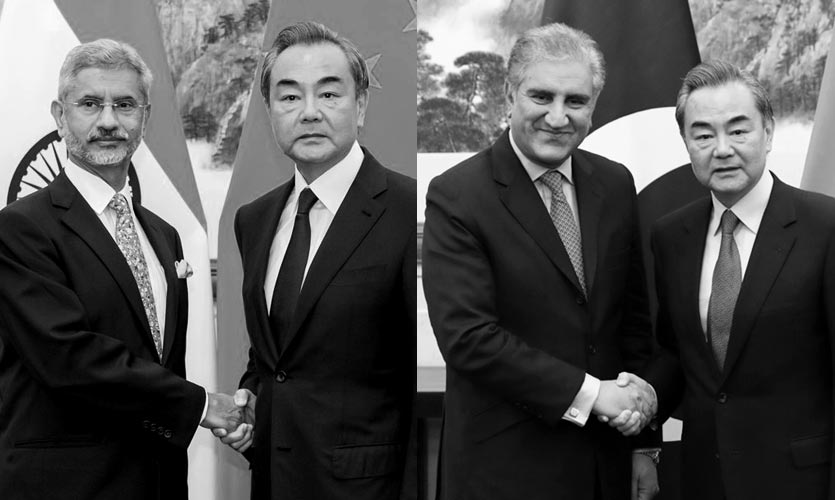Earlier this week, Chinese Foreign Minister Wang Yi met with his Pakistani counterpart Shah Mahmood Qureshi in Islamabad, on the side-lines of the Organisation of Islamic Cooperation (OIC) meeting.
At the end of the meeting, the ministers reportedly signed five agreements, strengthening the countries’ “iron-clad friendship”. What does this mean for India?
Pak-China Camaraderie
Chinese State Councilor and Foreign Minister Wang Yi attended the 48th OIC Council of Foreign Ministers as a special guest, at Qureshi’s request. “This is the first time China is participating in an @OIC_OCI CFM & I am confident that interactions with OIC country counterparts will further strengthen engagement,” read the tweet by Pakistan’s foreign minister.
As per reports, on his first visit to the country since COVID hit the world, Yi “assured Pakistan of Beijing’s complete support in defending its sovereignty and territorial integrity “no matter what changes” internationally or within the two countries”. Out of the five agreements signed after their meeting, the first was between China’s Ministry of Education and the Higher Education Commission of Pakistan about “Mutual Recognition of Higher Education Certificates and Degrees”. Further, the China International Development Cooperation Agency and the Pakistan Ministry of Economic Affairs signed a Memorandum of Understanding on a project by the China-Pakistan Joint Research Centre (CPJRC) on Earth Sciences. A Letter of Exchange each for agricultural equipment and materials, joint agricultural technology laboratory equipment and materials, and agricultural demonstration station equipment and materials, were also signed.
According to Qureshi, the two countries also deliberated on the need for further engagement in Afghanistan to avoid the impending humanitarian crisis and ensure peace.
Yi’s India Visit
Wang Yi landed in New Delhi yesterday evening, on a surprise visit to the country. This is the first in-person meeting between India and China, after the Galwan Valley clash two years ago. According to reports, the Chinese minister has reached out to India on behalf of Beijing, in hopes of mending strained ties after the border escalation and inviting India to attend the Brazil-Russia-India-China-South Africa (BRICS) summit this year. The summit this year will also be significant as Russian President Vladimir Putin is expected to be in attendance. While India has maintained a neutral stance on the Russia-Ukraine conflict so far, standing with the leader at the meetingMemorandum of Understanding between China International Development Cooperation Agency and Pakistan Ministry of Economic Affairs on the Project of China-Pakistan Joint Research Centre (CPJRC) on Earth Sciences. could be perceived as an endorsement of his actions, especially since China’s goal is to host Prime Minister Narendra Modi for the same.
Additionally, China has always maintained that India should also keep bilateral ties in mind while handling the border issue, despite India repeatedly stressing that the border issue will have a serious impact on their bilateral relationship. India has categorically stated before that it cannot be “business as usual” with China unless the border issue in Ladakh is resolved. China made a similar move in 2017, when the BRICS summit was last held in the country. The Doklam border altercation was solved days before country leaders were to reach Xiamen for the summit. For India, complete disengagement is key to work towards normalising ties between the countries. National Security Adviser Ajit Doval, in his meeting with Yi, asked him to ensure that Beijing does “not violate the spirit of equal and mutual security”. Doval and Yi are the special representatives working on resolving the boundary issue. The Indian NSA also responded positively to Yi’s invitation to visit China, whilst saying that he will come as soon as the immediate issues are settled. China’s plan is to host a series of high-level visits before country heads meet at the BRICS summit.
Apart from this, Yi’s visit comes right after his Pakistan trip, as part of his tour of southern Asia. His meeting with Doval and External Affairs Minister Dr S Jaishankar took place a day after India slammed China over Yi’s comments on Kashmir, naming him in its statement, which is unusual. The Chinese foreign minister had said, “On Kashmir, we have heard again today the calls of many of our Islamic friends. And China shares the same hope.” India reminded the foreign minister that despite the Communist Party of China’s actionable activities, it has never made a public comment on the country’s “internal matters” such as its human rights violations against the Uyghurs in Xinjiang province, and other minorities, its occupation of Tibet, Hong Kong, or its cyber war against Taiwan. “Matters related to the Union Territory of Jammu & Kashmir are entirely the internal affairs of India. Other countries, including China, have no locus standi to comment. They should note that India refrains from public judgement of their internal issues,” said MEA spokesperson Arindam Bagchi. A report by the Indian Express highlights that even though referring to the Kashmir conflict with Pakistan as “internal affairs” of India, and maintaining that China has “no locus standi” with regard to it, are standard responses of the Indian government, stating that the country “refrains from public judgement of their internal issues” is not routine.
Cause For Concern?
Talking about India-China ties, EAM Dr Jaishankar says, “The world being what it is, self-interest and convergence cannot be fully counted upon, especially with neighbours. Their ambitions and emotions are not always predictable, nor indeed their risk-taking propensity. Few would have anticipated, for example, the turn that India’s relations with China have taken in the last two years. Any prudent policy therefore backs its posture with capabilities and deterrence.”
He adds, “A big responsibility of Indian diplomacy, therefore, is to create the widest set of options for such contingencies. This could mean acquisition of defence capabilities and other supportive measures or securing the understanding for our policies and actions from the international community. And for that matter, in managing or resolving more fraught situations.”
India is strategically the most important country to the West if it wants any standing in the geopolitical scenario in the subcontinent. The lack of Western sanctions on India despite having Russian dealings is proof that it is no pushover and is a valued ally. However, the ongoing conflict in Europe could potentially lead to these defence resources drying up. While India started on the path of self-reliance in terms of defence manufacture some time ago, more than 50 percent of its defence needs are still covered by imports. Private sector participation is key in terms of boosting defence acquisition and resolving India’s Achilles heel.
The Imran Khan-led Pakistan Tehreek-i-Insaf government is already on thin ice with a no-confidence vote put into motion in the National Assembly today, although it hasn’t yet been tabled. Pakistan, by itself, has always been irrelevant to India’s security concerns in the grand scheme of things. But China stands to gain tremendously from its weak economical and political situation. While the agreements signed between the two countries are important for Pakistan’s development, they pale in comparison to the damage the China-Pakistan Economic Corridor (CPEC) could do. Pakistan considers the CPEC a boon, as another country fulfils its infrastructure needs. However, as part of the $62 billion project, China has also taken control of the Gwadar Port, which India considers to be a part of the Indian Ocean. It is a strategic win handed over to China on a silver platter. This is also to the dismay of the US given its vested interest in Arabian waters and the Persian Gulf, which is why India is the US’ guy in the ocean. Although India placed a de facto ban on import of Chinese power equipment in June 2020, citing cybersecurity concerns after the Galwan Valley clash, India’s imports from China rose by 46.1 percent to $97.5 billion, in the 2021 calendar year. China’s imports from India also grew by 34.9 percent, however, only amounting to $28.1 billion. It’s possible that further border escalation is not on the minds of either India or China, but it is certain that only one country can afford it.
Arguably, India may stand a chance with its Western allies. Then again, as Ukraine continues to fight Russia without NATO or EU membership, and as has been reiterated in several pieces of this column before, India would do well to be ready to face any and all aggression without external help.
The Horus Eye is a weekly column written by Divya Bhan analysing current affairs and policies. This column does not intend or aim to promote any ideology and does not reflect the official position of The Sparrow.
Also read: Why Does India Need To Be Wary Of Western Influence Over The Russia-Ukraine Conflict?
Also read: The Quad Partnership And Why India Is The Key Player










